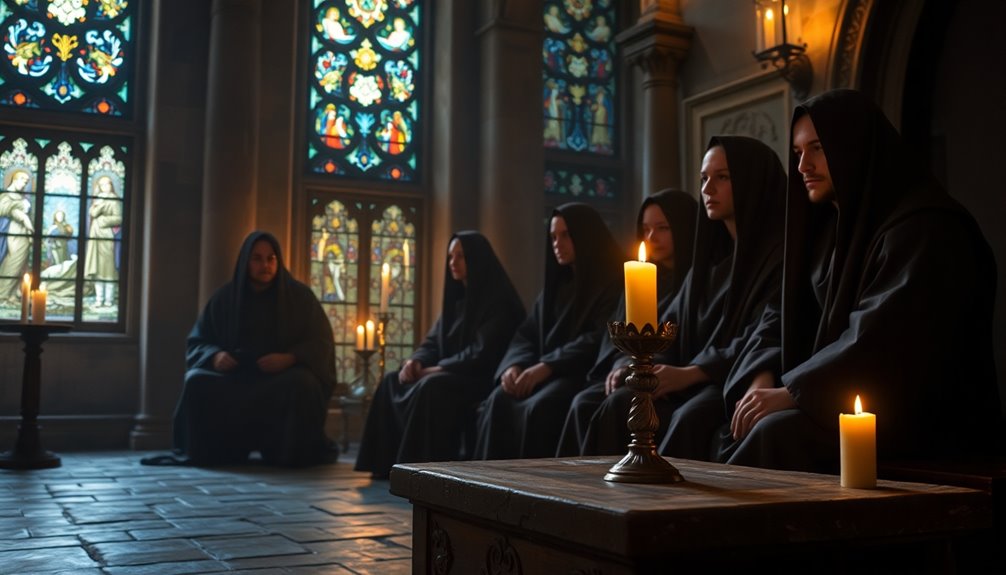Eunuchs in the Bible serve both as symbols of societal stigma and as influential royal officials. You'll find them mentioned in stories like that of the Ethiopian eunuch in Acts, who illustrates acceptance within the faith community. In Isaiah, eunuchs are promised a significant place in God's covenant, challenging traditional views of identity. Key figures like Hegai in the Book of Esther highlight their trusted roles in royal courts. While excluded from priesthood, their contributions reveal a richer narrative. Curious about the diverse identities and spiritual significance of eunuchs? There's much more to uncover about their roles in sacred texts.
Key Takeaways
- Eunuchs, referred to as "saris" in the Old Testament, held influential roles as royal officials and advisors in biblical narratives.
- Despite societal stigma, eunuchs were often trusted figures in royal courts, ensuring the safety of royal families as seen in the Book of Esther.
- Isaiah 56:4-5 promises blessings for eunuchs who uphold God's covenant, indicating their potential for redemption and inclusion in the faith community.
- The Ethiopian eunuch's baptism in Acts 8 signifies acceptance and challenges traditional views on marginalization within the early church.
- Jesus' acknowledgment of eunuchs in Matthew 19:11-12 elevates their status, promoting inclusivity and diverse identities within Christian communities.
Introduction
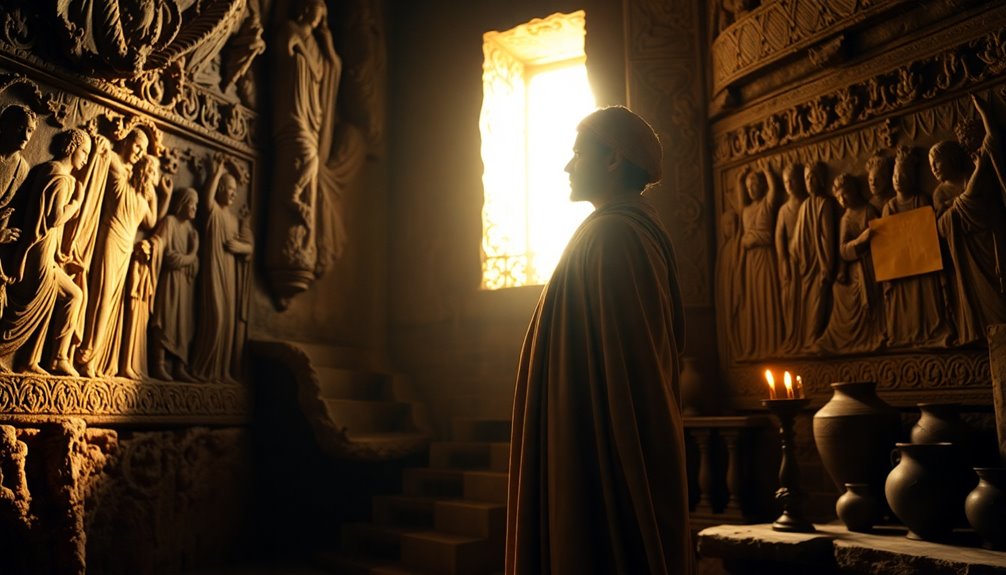
Eunuchs play a fascinating role in the biblical narrative, often reflecting deeper themes of identity and inclusion. In the Old Testament, eunuchs, known as "saris," appear frequently, typically in the context of royal officials. Their status didn't necessarily imply castration; instead, it highlighted their crucial roles as trusted advisors and administrators within the royal courts. For instance, Esther 2:3 mentions eunuchs managing the king's harem, showcasing their influence.
However, the Old Testament also imposed a social stigma against eunuchs, barring them from the priesthood and assembly due to their condition. This exclusion stands in stark contrast to the promise found in Isaiah 56:4-5, where God offers blessings and inclusion for eunuchs in His kingdom.
In the New Testament, Jesus reinforces this theme, as seen in Matthew 19:11-12, where He acknowledges eunuchs who choose to abstain from marriage for God's kingdom.
The Ethiopian eunuch in Acts 8:26-40 embodies this acceptance, demonstrating God's love for marginalized individuals. Through these narratives, you see how eunuchs illustrate broader themes of belonging and acceptance within the biblical text.
Eunuchs in Isaiah's Prophecy

In Isaiah's prophecy, you'll find powerful references that highlight the inclusion of eunuchs in God's covenant community.
Isaiah 56:3-5 specifically promises them a significant place and recognition for their faithfulness.
Let's explore both primary and secondary Bible references that further illuminate this transformative message.
Primary Bible References
Highlighting the importance of inclusivity, Isaiah 56:3-5 offers a powerful message for eunuchs, promising them blessings and a name greater than that of sons and daughters. In this passage, eunuchs are explicitly mentioned among the marginalized, showcasing God's love and acceptance for all, regardless of their social status.
This is a transformative moment in Scripture, as it redefines how eunuchs are perceived within God's kingdom. Traditionally seen as lacking societal value due to their inability to have children, eunuchs are instead honored within Isaiah's vision.
The promise that they'll receive a name better than that of sons and daughters reflects God's grace and the breaking down of barriers that often separate individuals from divine acceptance and community. By emphasizing celibacy as a valid and respected choice, Isaiah's prophecy brings hope and restoration to those who may feel rejected.
This radical acceptance highlights God's intention to include everyone in His redemptive plan, ensuring that eunuchs in the Bible are celebrated as integral members of the faith community.
In this way, Isaiah 56 serves as a powerful reminder of God's unwavering love for all people.
Secondary Bible References
While many may overlook the significance of eunuchs in biblical texts, Isaiah's prophecy sheds light on their vital role within God's plan. In Isaiah 56:3-5, God promises that eunuchs who keep His covenant will receive blessings, including a name and memorial greater than that of sons and daughters.
This powerful message emphasizes God's acceptance and love for eunuchs, challenging the stigma they faced in ancient Israelite society. Isaiah highlights that eunuchs shouldn't view themselves as marginalized or "dry trees." Instead, they hold a unique and valuable place in God's kingdom.
This prophetic inclusion not only affirms their worth but also serves as a precursor to the New Testament's broader embrace of all marginalized individuals, reinforcing the theme of God's unconditional love. Isaiah's words remind you that regardless of societal labels or physical condition, you're significant in God's redemptive plan.
Eunuchs aren't merely overlooked figures; they're essential to understanding God's expansive grace. Embrace this message, knowing that acceptance is central to your identity in the divine narrative.
Eunuchs' Roles in Royal Courts
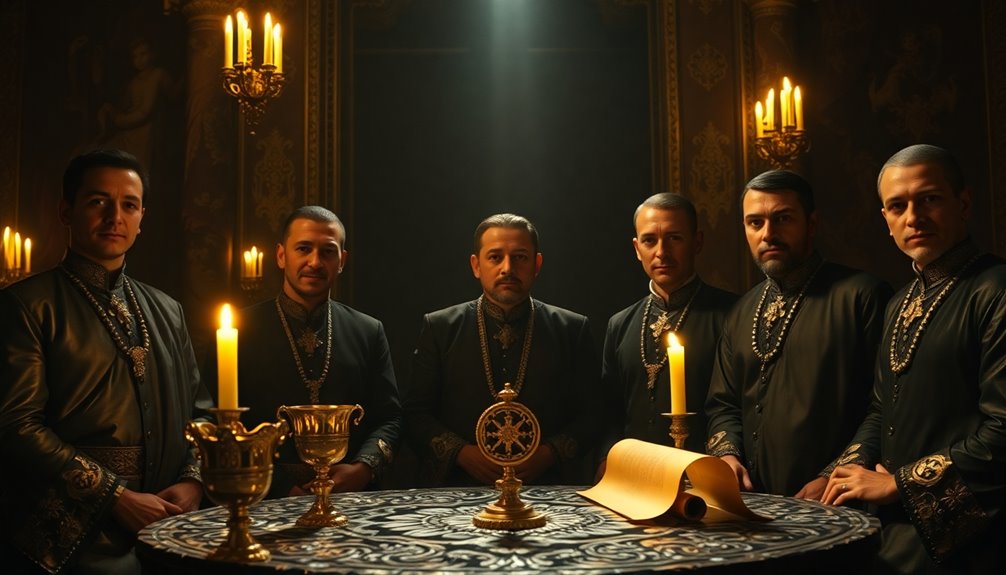
Eunuchs played vital roles in royal courts, often serving as trusted advisors and administrators. Their unique position, devoid of familial ties and heirs, made them invaluable in maintaining stability within the monarchy.
In the Book of Esther, you'll find eunuchs like Hegai and the seven eunuchs of Xerxes, who held significant positions in managing the royal harem and influencing royal decisions. Their influence extended beyond mere caretakers; they actively participated in governance, navigating the complexities of power dynamics.
The Old Testament term "saris" referred to high-ranking officials, initially without any implication of castration, highlighting the essential roles eunuchs played in royal administration. By overseeing the royal harem, they ensured the safety and secrecy of the royal family, as well as managing domestic affairs within the palace.
Historical accounts show that eunuchs often enjoyed high social standing, allowing them to wield considerable power and influence in royal courts.
In a landscape where loyalty is paramount, eunuchs became trusted figures, shaping the course of governance while balancing the delicate intricacies of court life. Their contributions were vital in the functioning of the monarchy, demonstrating their importance throughout biblical history.
Cultural Significance of Eunuchs
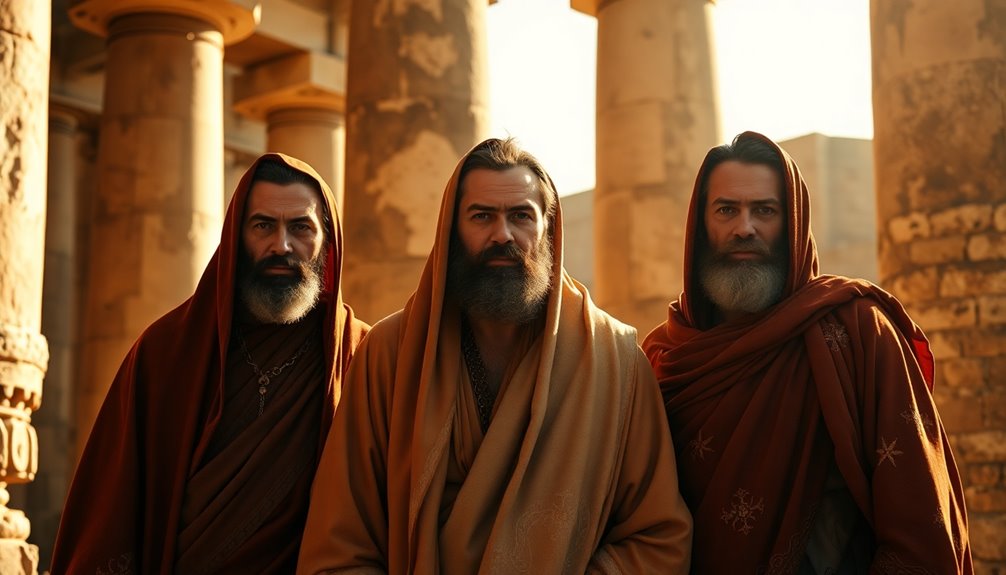
The cultural significance of eunuchs in biblical times extends beyond their roles in royal courts; it reflects deep societal values and power dynamics. Eunuchs often served as trusted advisors and administrators, and their loyalty was prized because castration prevented them from establishing competing dynasties. In the Old Testament, eunuchs are mentioned in various influential roles, like those serving King Xerxes in the Book of Esther, underscoring their importance in governance.
A notable cultural shift occurs in Isaiah 56:4-5, where God offers blessings and inclusion to eunuchs within God's kingdom. This challenges the stigma surrounding their status, highlighting their value in the community of faith.
This theme of inclusion continues in the New Testament with the Ethiopian eunuch in Acts 8:26-40, who represents God's grace and acceptance. His story signifies the breaking down of barriers, emphasizing that marginalized individuals are welcome in the Christian faith.
Eunuchs and Societal Status
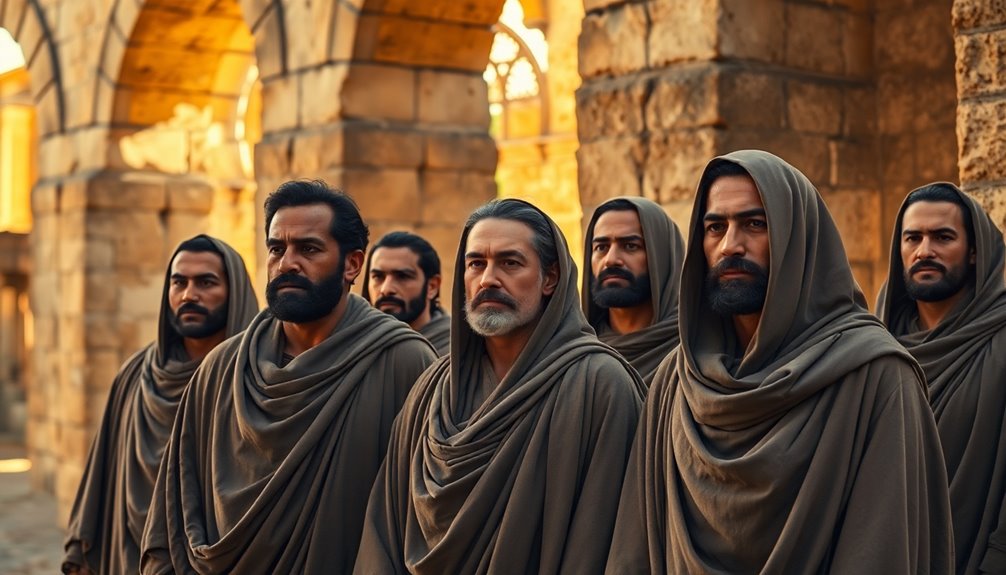
You might think eunuchs were always societal outcasts, but their roles in ancient courts tell a different story.
Many enjoyed significant status as trusted advisors, proving their value went beyond mere physical attributes.
It's essential to explore how these misconceptions shaped their experiences and contributions in biblical narratives.
Debunk Common Eunuch Misconceptions
Significant roles in society often defined eunuchs in biblical times, challenging common misconceptions about their status. Many viewed eunuchs as merely outcasts, but in reality, they held influential positions, often serving as trusted officials and administrators in royal courts. For instance, Potiphar in Genesis exemplifies a eunuch who wielded considerable power, showcasing their capability to govern effectively.
While some may think eunuchs were marginalized, biblical texts like Isaiah 56:4-5 highlight their inclusion in God's kingdom, promising blessings to those born with a physical defect. This indicates that they weren't solely defined by their condition. Eunuchs often enjoyed elevated societal roles due to their loyalty and trustworthiness; their inability to produce heirs meant they could serve closely alongside royalty without distractions.
In the early church, eunuchs continued to serve God's purpose, demonstrating that their contributions were valued. Their societal status varied across cultures and periods, reflecting a complex history that counters the stereotype of eunuchs as shameful figures. Instead, they played critical roles in governance and society, proving that their existence went far beyond mere misconceptions.
Eunuchs as Societal Outcasts
Throughout biblical history, eunuchs often found themselves on the fringes of society, grappling with the stigma attached to their inability to procreate. In the biblical world, this inability led to their status as societal outcasts, explicitly outlined in Leviticus 21:20 and Deuteronomy 23:1, which barred them from serving in the priesthood and assembly.
However, not all eunuchs faced complete exclusion. Some, like those in royal courts, found ways to serve God's purpose, becoming trusted officials and administrators, as seen in the Book of Esther.
Despite their marginalization, Scripture provides a counter-narrative. Isaiah 56:4-5 promises blessings and inclusion for eunuchs who keep God's covenant, indicating a shift in perception and acknowledging their value.
The story of the Ethiopian eunuch in Acts 8:26-39 further exemplifies this, as he seeks understanding of Scripture and receives baptism, showcasing God's love for marginalized figures.
While society often viewed eunuchs who were born or made a eunuch as lesser, the biblical text emphasizes their potential for acceptance and redemption, challenging prevailing attitudes and opening doors for inclusion for eunuchs in faith and community.
Embracing Diverse Community Roles
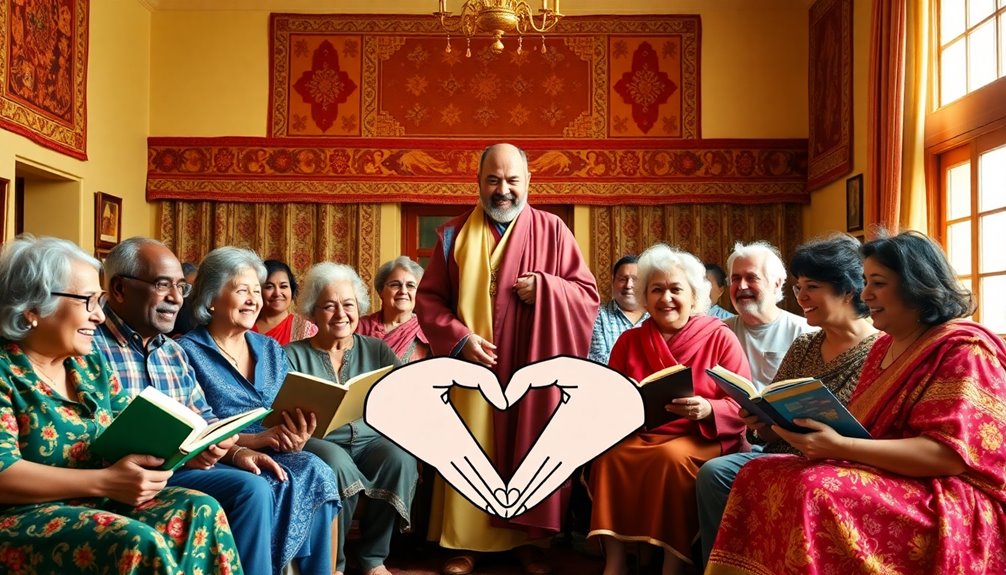
As you explore the role of eunuchs in the Bible, you'll see how diverse identities are embraced within the faith community.
Eunuchs like the Ethiopian official remind us that inclusion enriches our ministry and strengthens our bonds.
Recognizing these unique roles helps create a more welcoming environment for everyone, regardless of their background.
Embracing Diverse Identities in Faith
In today's diverse faith communities, embracing a wide range of identities is essential for fostering an inclusive environment. Eunuchs, as highlighted in Isaiah 56:3-5, are promised a place and a name in God's kingdom, demonstrating the importance of acceptance and recognition. By acknowledging their existence, you can help dispel the marginalization often faced by these individuals.
Jesus redefined eunuchs in Matthew 19:12, emphasizing the value of those who choose celibacy for the sake of the Kingdom. This act affirms their spiritual significance, showing that diverse identities can contribute meaningfully to faith.
The story of the Ethiopian eunuch's conversion in Acts 8 illustrates God's love for those seeking truth, regardless of societal stigma.
Historically, eunuchs held vital roles in royal courts, further proving that their identities and contributions mattered.
Inclusive Ministry for All
Embracing diverse identities within faith communities naturally leads to a focus on inclusive ministry for all, where every individual is valued for their unique contributions. Eunuchs, historically marginalized, are highlighted in biblical texts like Isaiah 56:4-5, which promise them a place in God's kingdom. By acknowledging their inclusion, you recognize that all individuals, regardless of background, can play vital roles in the community.
Jesus' teachings in Matthew 19:11-12 affirm eunuchs as essential members of the faith community, emphasizing their unique contributions to God's kingdom. The story of the Ethiopian eunuch in Acts 8 beautifully illustrates this point, showing God's love extends beyond social status or identity.
As you reflect on the early church's acceptance of eunuchs, consider how your ministry can embrace diversity and promote inclusion among all believers. Recognizing eunuchs as part of God's covenant people challenges you to create welcoming spaces for marginalized identities within your congregation.
Inclusive ministry means actively engaging with those who've been sidelined, ensuring that everyone feels valued and is empowered to participate fully in the life of the church.
Eunuchs' Unique Spiritual Significance
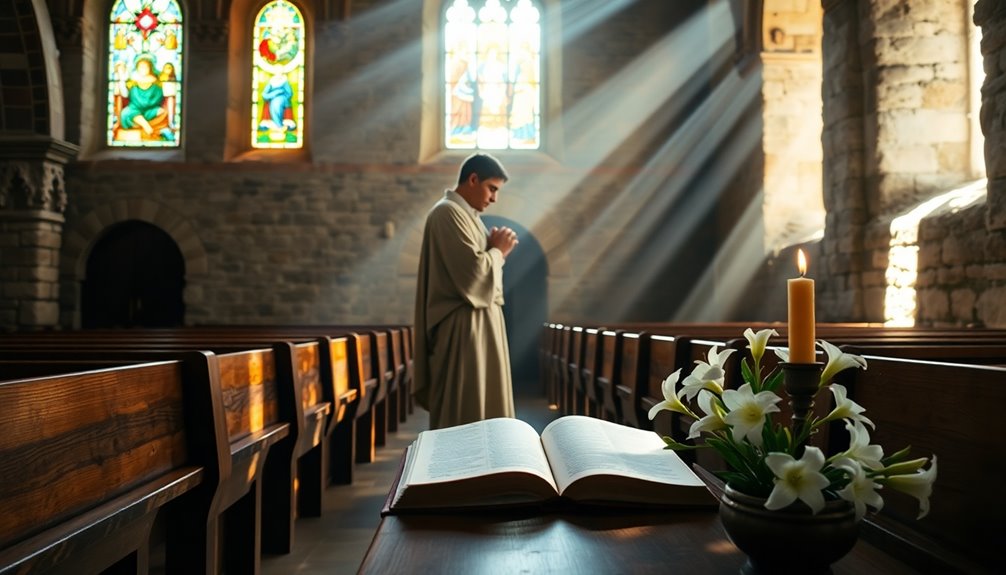
Eunuchs hold a unique place in the biblical narrative, symbolizing a profound spiritual significance that challenges conventional understandings of identity and belonging. In Matthew 19:11-12, Jesus acknowledges eunuchs as individuals who choose voluntary celibacy for spiritual service to the kingdom of heaven. This reframing elevates their status, highlighting that such a commitment can be a path to divine purpose.
Isaiah 56:4-5 further emphasizes this unique significance, offering a promise of honor and a lasting name for eunuchs who keep God's covenant. This assurance reflects their valued role within God's redemptive plan.
Eunuchs challenge traditional views of family and procreation, illustrating that spiritual commitment can surpass societal norms regarding sexuality and identity. Their presence in scripture highlights inclusivity, urging you to recognize diverse identities within the Christian faith.
Additional Resources
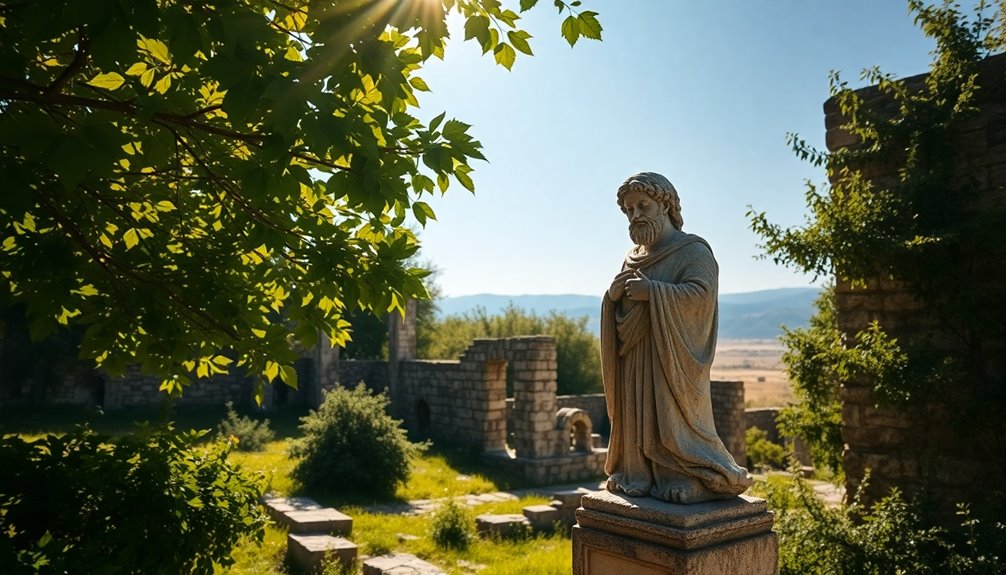
For anyone seeking to deepen their understanding of eunuchs in the Bible, a variety of resources are available that offer valuable insights and interpretations. One notable book is "Holy Sexuality and the Gospel" by Christopher Yuan, which explores biblical perspectives on sexuality, including the unique role of eunuchs.
Websites like BibleHub.com and BibleStudyTools.com provide comprehensive tools for studying the term "eunuch," offering definitions and historical context relevant to the ancient Near East.
For deeper theological insights, Gills Exposition of the Bible interprets specific passages related to eunuchs, enhancing your understanding of their significance in God's kingdom. The United Bible Societies have also published works that detail the roles of eunuchs, such as Potiphar, in governance and royal courts, showing how these individuals fit into the broader narrative of the Bible.
Lastly, Smith's Bible Dictionary serves as a useful reference for definitions and explanations of biblical terms, including those associated with eunuchs and their implications in Christian theology. These resources can enrich your study and provide a well-rounded view of eunuchs in scripture.
Frequently Asked Questions
What Does Jesus Say About Eunuchs?
When you explore what Jesus says about eunuchs, you'll find a compassionate understanding of their situation.
He identifies different types of eunuchs, emphasizing that their condition isn't their fault.
Jesus also highlights that some choose celibacy for the kingdom of heaven, framing it as a noble choice.
This perspective encourages you to see beyond societal norms, embracing a broader view of identity and commitment to spiritual service.
What Was the Purpose of Eunuchs?
The purpose of eunuchs historically has often centered around their roles in royal courts.
You'd find them managing harems and ensuring the safety of rulers, thanks to their inability to produce heirs. Their unique position allowed them to gain trust and influence within the kingdom.
Additionally, their commitment to service often symbolized loyalty and sacrifice, making them invaluable in both governmental and spiritual contexts.
They played key roles in maintaining stability and order.
What Are the Three Types of Eunuchs in the Bible?
When you explore the concept of eunuchs, you'll find three distinct types.
First, there are those born eunuchs, who naturally can't reproduce.
Then, you have individuals who've been made eunuchs by others, often through force or circumstances beyond their control.
Lastly, you'll encounter voluntary eunuchs, who choose celibacy to focus on spiritual commitments.
Each type reflects different paths and purposes in life, showcasing diverse expressions of dedication and sacrifice.
Can a Woman Be an Eunuch?
You might wonder if a woman can be considered a eunuch. Traditionally, the term has been associated with males, often linked to castration or celibacy.
However, if you think about commitment to a spiritual life, women can embody a similar dedication. While cultural norms historically defined women's roles differently, a woman choosing celibacy for a higher purpose reflects a form of spiritual eunuch, emphasizing her devotion to God over familial ties.

